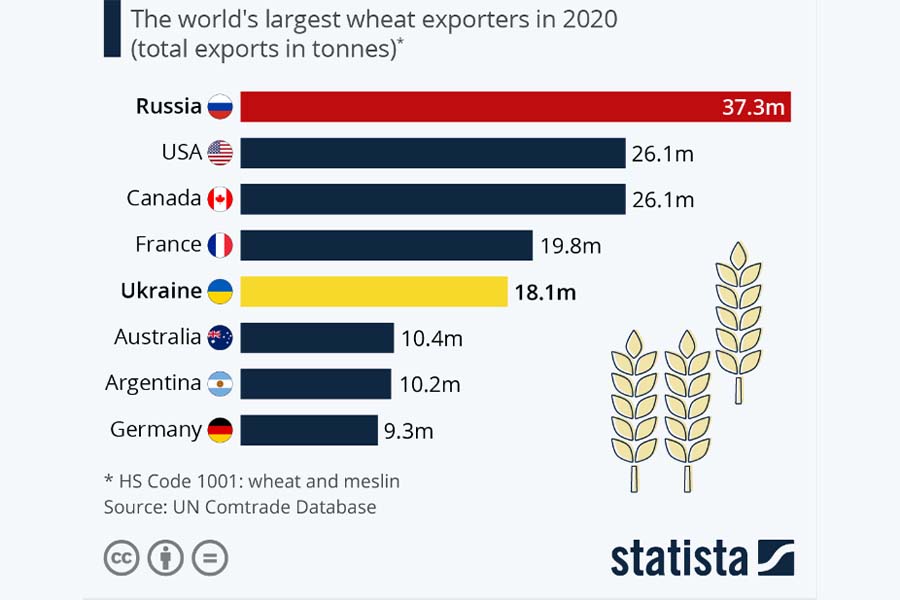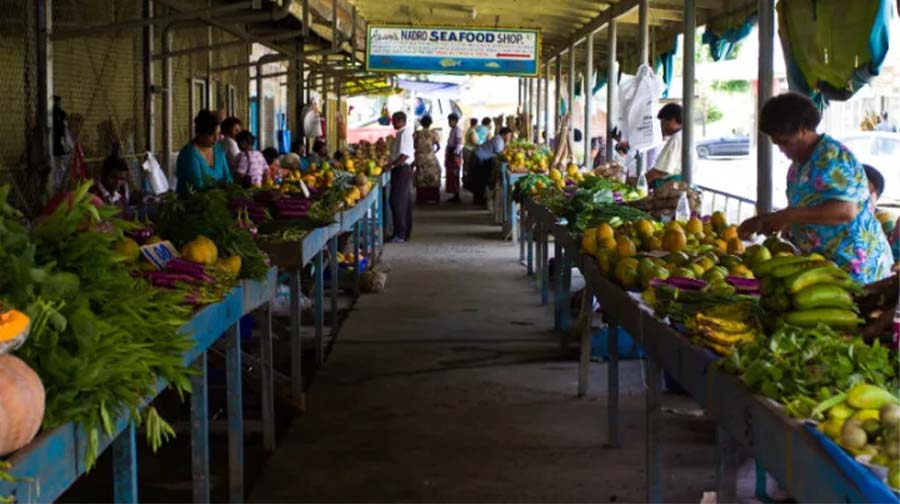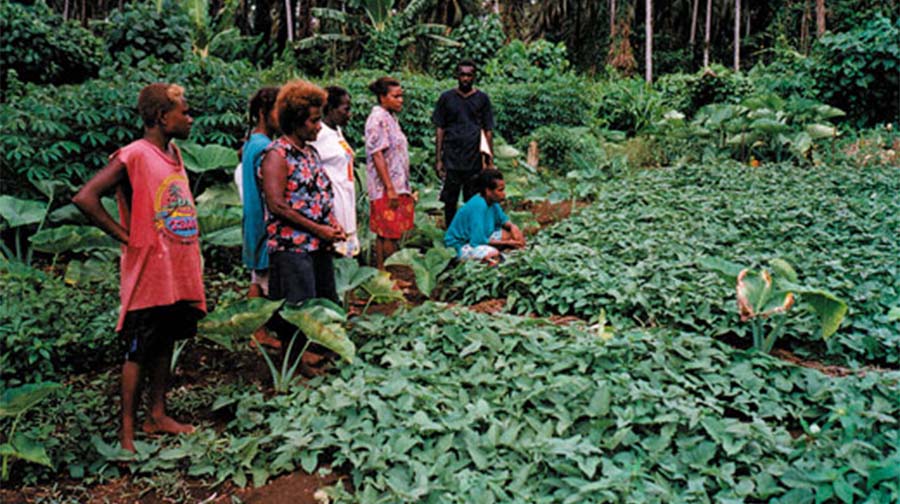The Russian invasion of Ukraine is an international crisis that affects regions far beyond its borders in Eastern Europe. On top of the deeply devastating human elements of the conflict, the situation in Ukraine poses an alarming threat to global food security, to which islands are especially vulnerable.
Russia and Ukraine as Key Exporters in Global Food Markets
Currently, Russian and Ukrainian exports together account for approximately 12% of total calories traded in the world, and the two countries are among the top five global exporters for valuable commodities, including 30 percent of global crops, including wheat, barley, sunflowers and maize. The Russian Federation also stands as a leading exporter of certain fertilizers, which play a key role in keeping corn, soy, rice and wheat yields high. Since the onset of the conflict, global markets have already witnessed a 21 percent increase in wheat prices, 33 percent increases in barley, and a striking 40 percent increase in some fertilizers.

Linking Global Markets and Food Security on Islands
The Covid-19 pandemic has further underlined the fragility of global markets, with the disruption of many activities in fisheries, livestock, agriculture, and their supply chains. The negative impacts of the pandemic on food security are further compounded by the effects of climate change and climate-related disasters, which islands are among the most susceptible to these events. Climate-related disasters and weather events threaten the viability of agricultural land, marine resources, and loss of food infrastructures, which in many cases are the primary sources of livelihood for many islanders. The combination of these factors have led to an increased dependency on international food exports in many island nations around the world. In fact, the international Food and Agriculture Organization (FAO) reports that the Caribbean, the Pacific and many small islands in the Atlantic and Indian Oceans depend on food imports, with 50 percent of Small Island Developing States (SIDS) importing more than 80 percent of their food, and nearly all SIDS importing 60 percent of their food.
Short-Term Implications of the Russia-Ukraine Conflict on Island Food Security

Source: John Trif
The most obvious short-term impact as a result of the Russia-Ukraine conflict is the disruption in wheat and grain exports from both countries. With a stark decrease in global supplies of wheat and grain, food prices on islands will increase. This is in addition to already higher food prices on islands due to their relatively limited access to certain resources and dependency on international exports. In addition, food prices are closely linked with global prices and exports of oil. Russia is among the world’s top exporters of oil and gas and their ability to export at the moment is blocked by global economic sanctions, ultimately causing a skyrocketing in oil prices worldwide. The higher the prices of oil, the more expensive the freight and transportation costs to deliver commodities, further contributing to higher food prices.
Insights from the Caribbean
Leaders and economists in the Caribbean are already reflecting on how the conflict in Ukraine will specifically impact food security in their region. A recent Forbes article highlighted the insights of several experts in the Caribbean, including Renata Clarke, FAO Sub-Regional Coordinator for the Caribbean. Clarke stated that in addition to unprecedented increases in food security as a result of the global pandemic, “The additional price volatility that would be brought on by conflict in Ukraine will affect the most vulnerable in a region like the Caribbean where so many countries still depend too heavily on food imports.”
Other media outlets are also facilitating this discussion, such as the Jamaican based CVM Television station, who broadcasted a panel discussion with Indar Weir, Minister of Agriculture, Food and Nutritional Security Barbados, and Pearnel Charles Junior, Jamaica’s Minister of Agriculture and Fisheries on the impacts of the Russia-Ukraine conflict on regional food security. Watch the conversation here.
What are the Long-Term Impacts of the Conflict on Islands?
The conflict in Ukraine could implicate the stability of global markets and food security for years to come, and SIDS will be especially vulnerable to continued disturbances in supply chains and food prices. The persistence of this crisis could persuade further countermeasures from the international community, which would continue to block Russian exports on natural gas, wheat, grain, and fertilizer – keeping food prices high. On top of the approximate 14 million tonnes of wheat and 16 million tonnes of maize currently frozen in Russia and Ukraine, Ukrainian farms are about to miss critical planting and harvesting seasons. This means that future imports of wheat and grain from the region will continue to be impacted for the foreseeable future. SIDS generally have less available resources, land, and funds for large-scale agricultural projects in comparison to many developed nations, thus their ability to quickly adapt to the shortage of commodities is more challenging.
Looking Towards the Future: How Can Islands Protect from Further Food Insecurity

Source: TerraCircle projects
The prevailing crisis in Ukraine has underscored both the inter-connectivity of the global economy and the inherent vulnerabilities faced by many developing countries, particularly SIDS. While larger industrialized nations may have the ability to rapidly transition and fund alternative energy sources and agricultural production, many islands do not share the same luxury of immediate capabilities. It is pertinent that islands instill sustainable and long-term solutions so that they can develop resilience to future events and market shocks. For many islands, this requires large-scale investments by international donors in sectors such as agriculture, fisheries, as well as projects geared towards climate resilience.
At this year’s Island Finance Forum we want to keep this conversation and exchange of knowledge at the forefront of decision-making at the international, regional, and local levels so that islanders can adapt and develop resiliency in order to alleviate food insecurity and strengthen their social, political, and economic sectors. This free virtual event will bring together senior financiers, development partners, a DSADnd regulators to share and exchange expertise on sustainable and inclusive financial structures in island communities and bridge the gap between sustainable development practitioners and financial stakeholders.

I joined Island Innovation in 2020 in order to lead the efforts on the internal operations with the customers, sponsors, the Island Finance Forum and the Virtual Island Summit. What I love about Island Innovation is that we share the same values to make this world a better place by putting all the islands together to find solutions to meet the UN development goals. I believe that it is through combining our knowledge that we will have the most impact.

















